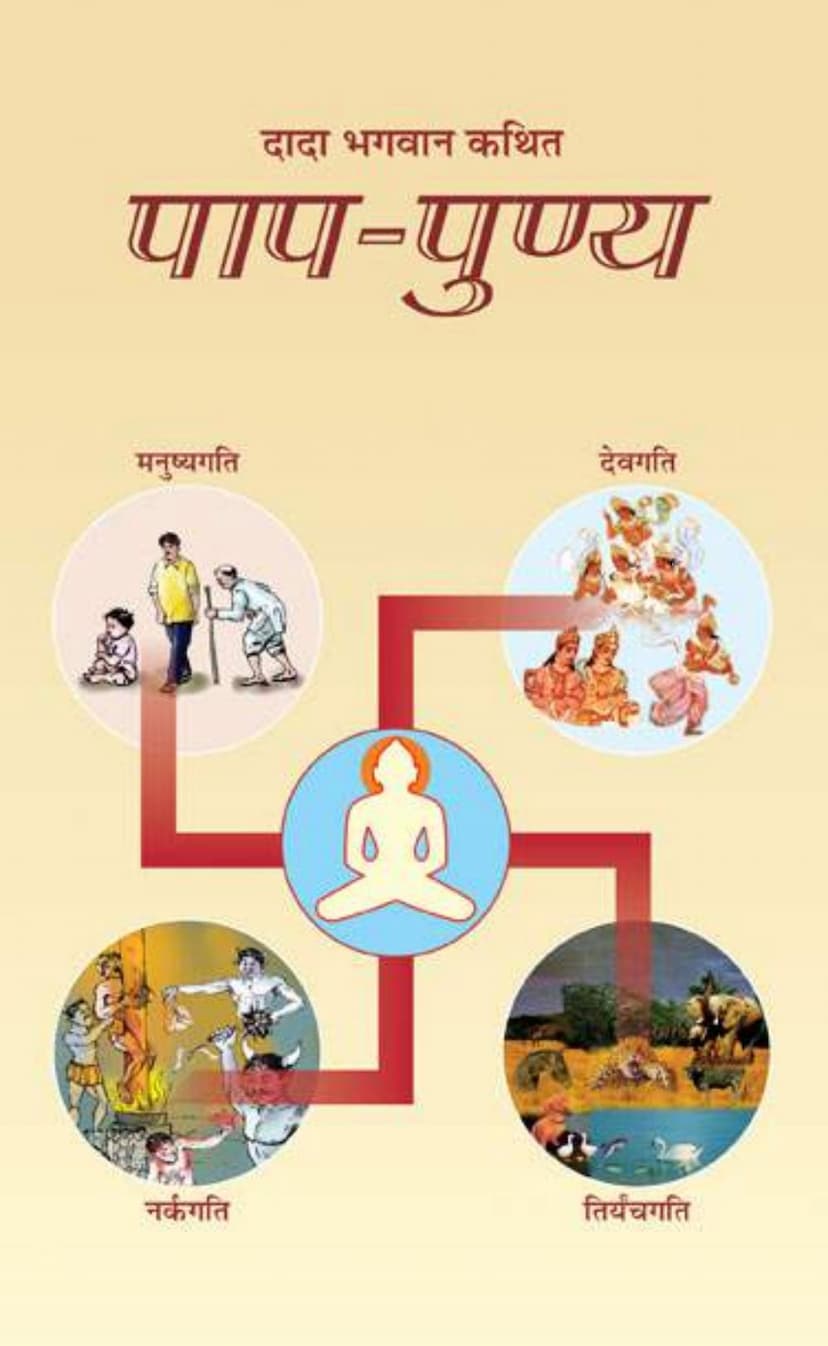Paap Punya
Added to library: September 2, 2025

Summary
The book "Paap Punya" (Sin and Merit) by Dada Bhagwan, published by Shri Ajit C. Patel, Dada Bhagwan Aradhana Trust, offers a profound spiritual perspective on the concepts of sin and merit within the framework of Jain philosophy. The book, compiled from Dada Bhagwan's discourses, aims to clarify these often misunderstood terms and their impact on an individual's spiritual journey.
Core Teachings and Concepts:
-
The True Definition of Sin and Merit: Dada Bhagwan's teachings present a unique and simplified definition:
- Sin (Paap) is caused by giving pain or causing suffering to any living being. This includes causing suffering through thought, word, or deed. The underlying principle is that God resides within every creature, visible or invisible. Harming any creature is therefore harming the divine.
- Merit (Punya) is achieved by giving happiness or causing happiness to any living being. This involves acting with kindness, compassion, and a desire to alleviate suffering.
-
The Role of Intention: The book emphasizes that the intention behind an action is crucial in determining whether it leads to sin or merit. Even seemingly good actions performed with selfish intent or for worldly gain are not considered pure merit.
-
The Law of Karma: The core of the teachings revolves around the universal law of karma. Actions (karma) performed with sin or merit create impressions and consequences that manifest in this life and future lives. The book explains that the world is governed by these karmic consequences, not by a divine administrator.
-
Types of Merit and Their Outcomes:
- Material Merit: This type of merit leads to worldly pleasures and good fortune, such as wealth, comfort, and pleasant circumstances. However, this merit is temporary and ultimately does not lead to liberation.
- Merit for Liberation (Moksha): This is a higher form of merit that is performed with the ultimate goal of spiritual liberation. It involves reducing negative tendencies like anger, pride, deceit, and greed, and giving generously without expectation of return. Such merit creates the conditions for meeting a Self-Realized Master and ultimately attaining moksha.
-
The Nature of Suffering and Happiness: The book posits that suffering is a result of past sins, and happiness is a result of past merits. The current circumstances of one's life are seen as the fruit of past actions.
-
The Importance of Self-Realization (Atmajnana): While performing meritorious deeds is encouraged, the ultimate goal is to transcend the cycle of sin and merit altogether. This is achieved through Self-realization, understanding the true nature of the Self as pure, blissful, and eternal, distinct from the body and mind.
-
Pratikraman (Repentance): The book highlights the practice of pratikraman as a crucial tool for purifying oneself from past sins. It involves sincerely apologizing to the affected being (internally or externally) and resolving not to repeat the mistake. This act of repentance helps to neutralize the negative karmic effects.
-
The Akram Path: Dada Bhagwan's teachings are presented as an "Akram" or "step-less" path, which means liberation can be attained in a short period through a direct experience of the Self, facilitated by a Gnani Purush (Self-Realized Master). This is contrasted with the "kram" or step-by-step path that involves gradual purification through various spiritual practices.
-
The Role of the Gnani Purush: The Gnani Purush is central to the Akram path. Through the "Gnan Vidhi," they bestow Self-realization, enabling individuals to experience their true Self and break free from the cycle of karma.
-
The Illusion of "I do": The book stresses that the sense of being the "doer" (karta bhav) is the root cause of karma. True liberation comes from understanding that one is not the doer but a witness to the unfolding of actions and their consequences, orchestrated by the laws of nature.
Key Takeaways:
- Responsibility for One's Actions: The ultimate responsibility for one's suffering and happiness lies with oneself and one's past actions.
- The Power of Intention: Good intentions and pure motives are essential for spiritual progress.
- Beyond Merit for Material Gain: The true purpose of merit should be spiritual liberation, not just worldly comfort.
- The Importance of Repentance and Self-Correction: Pratikraman and self-awareness are vital for mitigating the effects of past sins.
- The Path to Liberation: Self-realization through the Akram path, facilitated by a Gnani Purush, is the direct route to freedom from the cycle of sin and merit.
In essence, "Paap Punya" by Dada Bhagwan provides a practical and empowering guide to understanding the intricate workings of karma, encouraging individuals to live consciously and to seek the ultimate liberation through spiritual knowledge.